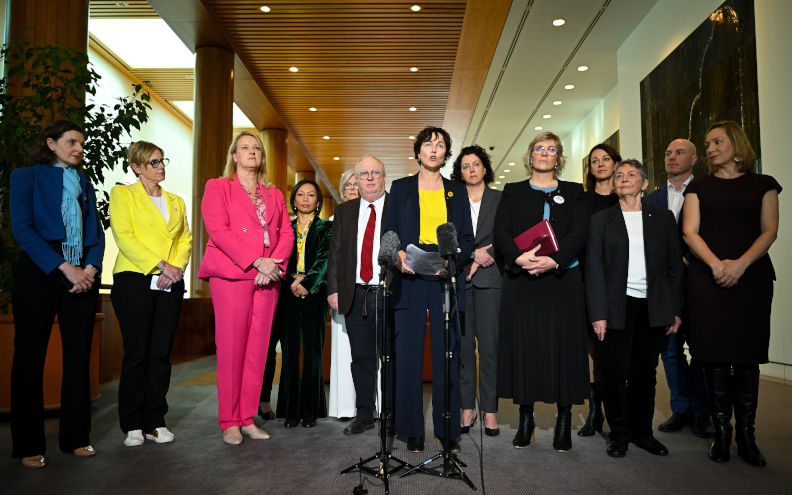More support for the two-party system? High time for major electoral reform
August 15, 2024
The Government is planning to introduce a package of reforms to make it harder for Independent candidates to attract donations to win seats. This articles argues that it would be much better to concentrate on major electoral system reform: Introduce Proportional Representation - Party List.
The latest reports in The Saturday Paper (August 3 - 9, 2024) suggests that the Government is planning to introduce a package of reforms to make it harder for Independent candidates to attract donations to win seats. At the same time this would favour the major parties. While it is not clear if minor parties would be disadvantaged equally the policy is potentially disturbing. Four of the six Independents who won seats in 2022 are claimed to be at risk in the article by Jason Koutsoukis. The decline in primary support for both major parties in recent federal elections is unmistakable and discussed by many commentators now. Policies to change the electoral system should be written about now, widely. The traditional media still refuse to engage in this debate although the obvious alternative is Proportional Representation. Here is a real opportunity for the Albanese Government to start major electoral reform. The delay in the final Report of the JSCEM suggest differences of opinion on what to do.
The Greens, who have Proportional Representation in their policy platform, surprisingly are not specifically campaigning for it. They could initiate the case for Proportional Representation - party list. Considering that they received 12.2% of the vote in the 2022 federal election a properly designed proportional electoral system could yield them 18 federal seats instead of four now. Their entire strategy is still conditioned by the deeply entrenched two-major party culture based on the Single Member District electoral system. Just how potentially dangerous this system is should be obvious from the new nuclear policy by the Opposition leader Dutton. Australia’s major electoral system has now generated the nuclear option, an expensive and very slow alternative. It would also detract from the various non-nuclear alternatives adopted by the Greens and the ALP. Dutton is busily engaged in preparing to drag Australia into the creation of unnecessary nuclear energy plants which would be developed in seven safe conservative electoral seats. The use of the single member electoral system is now planned for an energy system that is not supported by the majority, indeed widely rejected for several important reasons. The role of the Opposition leader to develop opposing policies, the Westminster function of an Opposition leader, has resulted in quite unnecessary threats to possibly endanger the society. One would expect the Greens to fully understand the connection between the existing electoral system and this damaging policy initiative. Limiting the donations to Independent MPs would favour the major parties, particularly the Liberal Party in the four seats held by Independent women MPs. It would also reduce the capacity of Climate 200 and others to effectively support several additional candidates with substantial funding for the 2025 federal election. What one can conclude from speculative assessments thus far, following the Interim Report of JSCEM, is that the Committee, dominated by the ALP, seems caught between reducing private financial support for Independent candidates and thereby possibly supporting the Liberal Party’s recovery. The Governing Party seems still unable to move beyond the existing practice of protecting the two-party system. But that is exactly what has to change and what would assist the ALP in being re-elected in 2025.
A number of MPs and the Greens have commented on the Interim Report by the JSCEM. I select two comments by the Greens which are relevant in this context:
1 in 3 voters chose to vote for someone other than a major party at the last election. They deserve to see their vote result in representation in our Parliament and this will be our measuring stick for what makes a good reform.
The majority recommendations of this interim report reflect the broad appetite for reform and the compelling evidence from witnesses to the inquiry about what is needed, but the test will be whether a full package of reforms is ultimately brought forward, or just cherry-picked reforms aimed at propping up two major parties whose votes continue to decline. We will continue to push the government to implement recommendations that improve democracy before the next election.
My own submission to the JSCEM (Number 219) strongly supports the introduction of Proportional Representation - Party List and the reason why this would introduce a major positive political culture change in Australia. I received a sympathetic detailed response from the Special Minister of State, Don Farrell about my submission. Clearly, he did not disagree with this advocacy. However, the article in the Saturday paper suggests that the outcome “will be in line with the electoral reforms passed in NSW and Victoria which make it harder for new Independents to win seats”.
The appetite for electoral reform is far greater than that. Farrell should bite the bullet and come up real, major reforms. Australians will thank him for that and the voters will show their appreciation in 2025!

